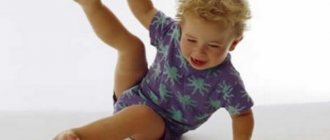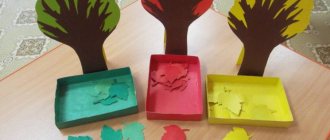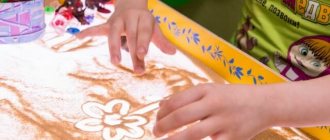The intellectual development of a child means the development of higher psychological functions (memory, thinking, perception, speech, imagination), as well as the emotional, social and physical spheres of intelligence. In short, intelligence is thinking ability. Thinking, in turn, depends on emotional, social, physical development and memory. Therefore, parents who decide to help their child should organize classes taking into account all the listed functions and areas. To do this competently, it is important to know how intelligence develops at different age stages. Moreover, you can directly influence and help your child already in preschool age.
Age and development of intelligence
If we talk about preschool age, that is, the period from 3 to 7 years, then the development of intellectual abilities is closely related to the type of thinking. In younger preschoolers (3-4 years old), visual-effective thinking predominates, so classes must necessarily include physical activity and manipulation of objects.
At 4-5 years old (middle preschool age), thinking develops to visual-figurative, so it is possible to include substitute toys, role-playing games and educational cartoons. As well as games for social interaction and moral development.
The most active period of intellectual development in children occurs in the senior preschool age, that is, 5-7 years. Verbal thinking predominates and abstract-logical thinking is formed, so here you can already include didactic and logical games. Attention gradually becomes more voluntary, so it is easier for the child to concentrate on solving complex problems.
Classes should be conducted in the form of a game so that the child, being carried away by the plot, does not notice how he is learning at the same time. In another form, it will be extremely difficult for you to conduct a lesson, because preschoolers are restless, their will is undeveloped, and conditioned inhibition is still being formed, so young children do not understand why they need to study something when they want to play. They cannot focus on anything for long.
Also, you should not expect a preschooler to be enthusiastic about his activities. The best option is to notice when a child shows interest in a certain activity (for example, reading, drawing, writing). Classes should be held no longer than 15 minutes: you will notice when your baby gets tired and loses interest.
The intellectual development of preschoolers is closely related to emotions and social interaction. If a child feels comfortable in the family, feels loved, is supported and praised, then he will develop harmoniously mentally. In addition, the baby acquires basic skills, abilities and knowledge through contact with his family.
Children develop differently, and it makes no sense to expect your child to have the same level of intellectual development as someone else. This can ultimately lead to the formation of low self-esteem and self-doubt.
Intellectual game for children of senior preschool age
Intellectual game for children 5-7 years old “Young talent”
Goal: to create conditions for generalizing and systematizing the knowledge of children of senior preschool age with pronounced abilities. Objectives: 1. Contribute to consolidation of acquired knowledge and skills; 2. Develop interest in intellectual activity, the desire to play games with mathematical, logical and artistic content; 3. Show persistence, the ability to strictly follow instructions, determination, mutual assistance, resourcefulness and ingenuity; 4. Encourage individuals to independently search for necessary information and solve problem situations; 5. To cultivate in children the ability to take initiative in order to gain new knowledge, perseverance, determination, ingenuity, and mutual assistance. Equipment: envelopes with entertaining puzzles, videos with pictures from fairy tales, easel, markers, illustrations of geometric shapes, prizes. Progress of the game: Host: Good afternoon. We are glad to see you today at our intellectual game “Young Talent”. The game is attended by a team of senior group No. 1 and a team of senior group No. 2. I ask the teams to introduce themselves and greet each other. (Greetings from teams and captains) Team “Whychki” “We are inquisitive minds, We have questions for you.” “Why” is a favorite question, Helps us grow.” Team “Knowledgeable” “If you want to know a lot, you should read a lot.” Our motto: “Don’t lose heart! Go through everything and find out everything! Presenter: To sum up the results for each task, we have selected a jury: (presentation of the jury members). Our game consists of five tasks. 1 task “Visiting a fairy tale”: In this task, teams need to answer 10 questions. A limited amount of time is allotted for this task: 2 minutes for each team. When the time is up, a beep sounds. For each correct answer to a question, teams receive 1 point. Questions for the “Why” team: 1. The name of the boy who was carried away by the Geese-Swans? (Ivanushka). 2. Who is stirred by sour cream, cold at the window? (Kolobok). 3. The hero of a Russian folk tale who rode a stove? (Emelya) 4. The harmful old woman from Russian folk tales? (Baba Yaga) 5. Little girl living in a flower? (Thumbelina) 6. Wooden doll with a long nose. (Pinocchio) 7. In what fairy tale did the carriage turn into a pumpkin? (In "Cinderella") 8. The evil owner of the puppet theater with a long beard. (Karabas-Barabas) 9. What type of transport did the bears use in the fairy tale “The Cockroach”? (On a bicycle) 10. What did the crocodile use to extinguish the blue sea in the fairy tale “Confusion”? (Pies, and pancakes, and dried mushrooms.) Questions for the “Knowledge” team: 1. The name of the girl whose brother turned into a little goat? (Alyonushka) 2. Fairy-tale onion boy? (Chipolino) 3. A harmful old woman with a rat. (Shapoklyak) 4. Cheburashka’s green friend? (Crocodile Gena) 5. Who swallowed the washcloth in the fairy tale “Moidodyr”? (Crocodile) 6. What gift did the fleas bring to the Tsokotukha Fly? (Boots) 7. Fairytale girl with blue hair? (Malvina) 8. What were the names of the three little pigs? (Nif-nif, Naf-naf, Nuf-nuf) 9. What was the name of the grandmother from whom all the dishes ran away? (Fedora) 10. How many pounds of chocolate did the elephant ask for his son in the fairy tale “Telephone”? (Five or six. Presenter: while our jury sums up the first task, you and I will sing the song “The sun is out”, which will cheer us up. Task 2. “Entertaining problems in a magic box” Presenter: Each child from the team takes turns taking it out of the box envelope with a problem. The presenter reads the problem, and the child who pulled the envelope answers, but if he cannot answer, the team helps him. For each correct answer without help, the team receives 2 points, and if the participant was helped with the answer, then the team receives 1 point. 1. Grandma Masha has a granddaughter Dasha, a cat Fluff, a dog Druzhok. How many grandchildren does grandma have? 2. A birch tree grew in the forest. Apples grew on it: 1 green, 2 red, 1 yellow. How many apples are there in total on the tree? 3 . Birds were flying over the site: a pigeon, a pike, two tits. How many birds are there in total? 4. What time of year is it now? 5. List all the winter months? 6. Is it morning or evening? 7. What other parts of the day do you know? 8. Today Thursday, and tomorrow? 9. Name the days of the week, starting with Monday. 10. What is your favorite day of the week? Which one is he? 11. Who is standing to your right? 12. Who is standing behind? 13. How is time measured? 14. How is temperature measured? 15. How can you measure length or height? 16. How is weight measured? Presenter: Well done team, you completed the task. While our jury is summing up the results, we are announcing a competition of riddles for fans: 1. The longest necked animal. (Giraffe) 2. Who carries the baby in the bag? (Kangaroo) 3. A bird that cannot fly and is not afraid of frost? (Penguin) 4. Long-eared coward. (Hare) 5. A beautiful but inedible mushroom. (Amanita) 6. The largest berry. (Watermelon) 7. A flower with a yellow center and white petals. (Chamomile) 8. Red mushrooms with an animal name. (Chanterelles) 9. What comes after winter? (Spring) 10. 2. When do the leaves fall from the trees? (In autumn) 11. 3. The hottest time of the year. (Summer) 12. The shortest month of the year. (February) 13. Snowy season. (Winter) 14. Black forest berry. (Blueberry) 15. Fruit that looks like a light bulb. (Pear) 16. What berries does the bear like? (To Malin) 3rd task “Captain Competition” Presenter: Team captains are asked to complete two tasks. The first task is logic puzzles. The captains need to listen carefully to the problem and answer the question posed: 1. Anton and Nikita played with different toys - a toy car and a pyramid. Anton did not play with the pyramid. What did each of the boys play with? 2. Sasha and Egor drank tea from cups of different colors: yellow and red. Sasha did not drink tea from a yellow cup. Which cup did each boy drink tea from? The second task is video questions. The captains will be shown 6 pictures each depicting heroes from different fairy tales. Your task is to name these fairy tales. Presenter: While the counting commission is counting the results of the 3rd round, I announce a musical break. Presenter: The jury is given the floor to announce the results of task 3. 4 task. “Smart Figures” Presenter: The teams are offered a visual memory task. Teams look at a poster depicting geometric shapes for 30 seconds, then are asked to draw the same image on an easel from memory. Presenter: Musical break. The jury is given the floor based on the results of the 4th task. 5 task. “Fairy-tale guest” Presenter: In this competition, a surprise awaits you, it will be led by a fairy-tale character. Guess: which Pushkin fairy-tale heroine received from her owner a home made of pure crystal and a guard of honor for her jewelry work and vocal skill. (The squirrel from “The Tale of Tsar Saltan.”) The squirrel runs in. Squirrel: You guessed correctly! Hello! I came to your game and prepared very difficult questions: 1. Grandma Dasha has a grandson Pasha, a cat Fluff, and a dog Druzhok. How many grandchildren does she have? (one) 2. Which figure has neither beginning nor end? (circle) 3. Who swims faster - a duckling or a chicken? 4. Who will reach the flower faster - a butterfly or a caterpillar? 5. Two fish flew over the forest. Two landed. How many flew away? 6. What do crocodiles eat at the North Pole? 7. There were children's books on the shelf. The dog ran up and took one book, then another, then two more books. How many books has the dog read? 8. The hare invited two bears and three hedgehogs for the New Year. How many devices should he supply? 9. Who will moo louder – the rooster or the cow? 10. What color is Kolobok’s hair? Squirrel: Well done guys, you completed the task! And now, while the jury sums up the results, we will play my favorite game “Distorted Mirror”; I will show the movement, and you perform the movement in reverse (for example, the leader leans to the right, and the children to the left, leans forward, and the children back, etc. .) The results of the intellectual game are summed up and Squirrel rewards the winners.
We recommend watching:
Intellectual game for children 6-7 years old. The child’s readiness for school Game “Clever and Clever Girls” for children of the preparatory group of kindergarten Game “What? Where? When?" in the preparatory group Logical tasks for children 5-7 years old
Similar articles:
What are educational games for preschoolers
Outdoor games - tag for preschool children
Educational games in pictures for children 6-7 years old
Exercises to prepare the hand for writing for older preschoolers
Life safety games in the senior group
Games for mental development of younger preschoolers
At 3-4 years old, a child is actively exploring the world, he is interested in everything, and normally he can already speak a large number of words and construct sentences. He focuses all his curiosity on you, so it is during this period that parents begin to complain that the baby does not stop talking for a moment, is always asking about something and is almost constantly moving.
To direct his cognitive and motor activity in the right direction, you can use the following games for the development of intelligence.
- Who's missing?
Place 4 toys in front of the baby, preferably from the same category (for example, animals: dog, horse, bear, kitten). Ask your child to name the toys and then turn away. Remove one toy, and when the baby turns around, ask: “Who is missing?” This way you can study colors if you focus on color (polar bear, brown dog, etc.), shapes, names of objects and plants.
- Suitcase.
Take out a suitcase or sports bag and tell your child that you are going to the seaside (to nature, to grandma’s) and that you can only take 5 things with you. Start adding things together with your baby, while saying the number. This is how a child learns to count. Gradually increase the count and include ordinal numbers (first, second, etc.). You can use this game in another form: a basket for a picnic, groceries for the store, a briefcase for the kindergarten - there are many options. Thanks to this exercise, logical thinking is also formed.
- Back and forth and left and right.
Use whatman paper or room space. Draw a diagram of the city in which the treasure is hidden - the child will need to find it. On the way to the treasure, guide your child: take two steps forward, turn left, now three steps forward, take the letter with a riddle under the table. Read the riddle to your child, and he will have to guess - and so on until he reaches the finish line. Don't make the game too long or difficult.
Games for mental development of middle preschoolers
During this period, children begin to show interest in learning letters and writing, as well as establishing relationships with peers. You may notice that the baby is already singling out a particular child from others on the playground, so the age of 4-5 years is a favorable stage for the formation of social intelligence and learning ethical standards (girls should not be beaten, elders should be listened to). The following games will help you here.
- The letter is visiting.
Start your morning with a short fairy tale: “The letter A came to visit us today! (show your child a picture with a letter or a magnetic letter). She said that you are already big and it’s time for you to know what words are made of. You want to learn how to read fairy tales, right? The letter A is in such wonderful words as “mom”, “dad” (hang the words too and ask the child to show the letter A in them). Where is the letter A in the word “mother”? Right!"
- What's extra?
Place vegetables on the table, such as carrots, potatoes, onions, tomatoes, and place the fruit fifth. Ask your child if there are all the vegetables or is there anything extra? This game develops logic, vocabulary and knowledge about the world around you. Include unfamiliar objects gradually and increase their number.
- Good or bad?
It is important to study these concepts, as the baby begins to build personal psychological boundaries. What can be done and what cannot be done, how can they not treat him, and how can they? The game can be played after watching a cartoon or reading a fairy tale: “Did the caterpillars do good or bad? Is it possible to do this?
Games for mental development of older preschoolers
At the age of 5-7, games for the development of intelligence should contribute to the formation of abstract logical thinking, attention, memory, coherent speech, mathematical abilities, reading skills and knowledge about the world around us, and fine motor skills.
- Find differences.
Offer your child two very similar pictures, ask them to look at them carefully and say how they differ.
- Where did the fish from the fairy tale swim?
Show your child three pictures of an aquarium, and then tell a story in which you describe the fish and the aquarium itself. Then ask your child which of the three aquariums we are talking about.
- Invisible figures.
Draw a shape in the air with your fingers, and then ask your child to sketch it. Do this several times. When the figures are drawn, the baby will have to name them.
- Houses where numbers live.
Draw several houses where the numbers will live. Then compose a fairy tale about how number three went to visit number one. Ask your child how much you get if you add one to three? Explain that the number following the number 3 will be obtained. Ask him to count to 5 so that the child can calculate the answer himself.
Intellectual game in the camp
Proper organization of rest is of great importance. Mental stress and the cold season greatly deplete the physical and psychological state of the child. Therefore, in the summer you simply need to relax.
Only intellectual play in the camp can competently organize the process of creative self-realization and enrichment with additional knowledge. Such games are creative activities in which children demonstrate their understanding of life, reveal thoughts, aspirations, and sometimes feelings.




